英语错题本范本
- 格式:doc
- 大小:278.00 KB
- 文档页数:3
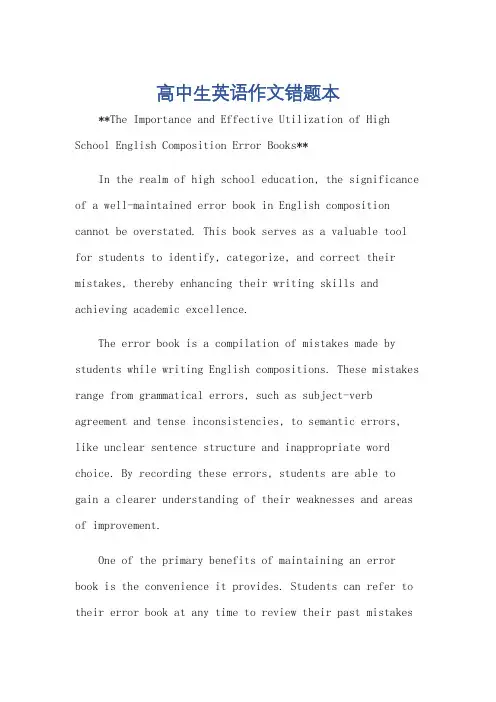
高中生英语作文错题本**The Importance and Effective Utilization of High School English Composition Error Books**In the realm of high school education, the significance of a well-maintained error book in English composition cannot be overstated. This book serves as a valuable tool for students to identify, categorize, and correct their mistakes, thereby enhancing their writing skills and achieving academic excellence.The error book is a compilation of mistakes made by students while writing English compositions. These mistakes range from grammatical errors, such as subject-verb agreement and tense inconsistencies, to semantic errors, like unclear sentence structure and inappropriate word choice. By recording these errors, students are able to gain a clearer understanding of their weaknesses and areas of improvement.One of the primary benefits of maintaining an error book is the convenience it provides. Students can refer to their error book at any time to review their past mistakesand avoid repeating them in future compositions. This constant self-reflection and revision helps solidify correct writing practices in their minds, leading to fewer errors and more confident compositions.Moreover, an error book promotes active learning. By actively searching for and recording their own mistakes, students are more engaged in the learning process and take ownership of their academic growth. This hands-on approach to learning not only improves their writing skills but also fosters a positive attitude towards learning and a growth mindset.To maximize the effectiveness of an error book, students should follow a few key strategies. Firstly, they should categorize their mistakes, grouping them by type (e.g., grammar, vocabulary, sentence structure). This helps them identify specific areas of weakness and target their revision efforts more effectively. Secondly, students should not only record their mistakes but also provide corrections and explanations. This加深了对错误的理解,并有助于防止在未来重复这些错误。

初中英语错题本初中英语错题本初中英语错题本初中英语错题本初中英语错题本初中英语错题本初中英语错题本初中英语错题本初中英语错题本Unit 2Space InvadersRichard StengelAt my bank the other day, I was s tanding in a line snaking around some tired velvet ropes when a man in a sweat-suit started inching toward me in his eagerness to deposit his Social Security check. As he did so, I minutely advanced toward the woman reading the Wall Street Journal in front of me, who, in mild annoyance, began to sidle up to the man scribbling a check in front of her, who absentmindedly shuffled toward thewhite-haired lady ahead of him, until we were all hugger-mugger against each other, the original lazy line having collapsed in on itself like a Slinky.I estimate that my personal space extends eighteen inches in front of my face, one foot to each side, and about ten inches in back —though it is nearly impossible to measure exactly how far behind you someone is standing. The phrase "personal space" has a quaint, seventies ring to it ("You're invading my space, man"), but it is one of those gratifying expressions that are intuitively understood by all human beings. Like the twelve-mile limit around our national shores, personal space is our individual border beyond which no stranger can penetrate without making us uneasy.Lately, I've found that my personal space is being invaded more than ever before. In elevators, people are wedging themselves in just before the doors close; on the street, pedestrians are zigzagging through the human traffic, jostling others, refusing to give way; on the subway, riders are no longer taking pains to carve out little zones of space between themselves and fellow-passengers; in lines at airports, people are pressing forward like fidgety taxis at red lights.At first, I attributed this tendency to the "population explosion" and the relentless Malthusian logic that if twice as many people inhabit the planet now as did twenty years ago, each of us has half as much space. Recently, I've wondered if it's the season: T-shirt weather can make proximity more alluring (or much, much less). Or perhaps the proliferation of coffee bars in Manhattan —the number seems to double every three months — is infusing so much caffeine into the already jangling locals that people can no longer keep to themselves.Personal space is mostly a public matter; we allow all kinds of invasions of personal space in private. (Humanity wouldn't exist without them.) The logistics of it vary according to geography. People who live in Calcutta have less personal space than folks in Colorado. "Don't tread on me" could have been coined only by someone with a spread. I would wager that people in the Northern Hemisphere have roomier conceptions of personal space than those in the Southern. To an Englishman, a handshake can seem like trespassing, whereas to a Brazilian, anything less than a hug may come across as chilliness.。
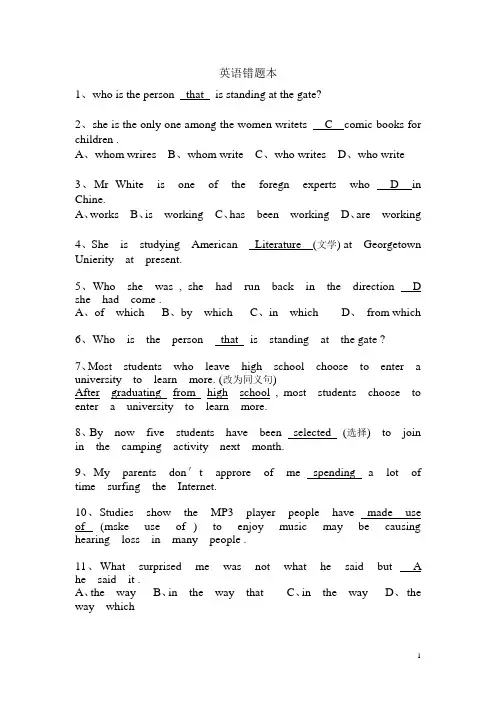
英语错题本1、who is the person that is standing at the gate?2、she is the only one among the women writets C comic books for children .A、whom wriresB、whom writeC、who writesD、who write3、Mr White is one of the foregn experts who D in Chine.A、worksB、is workingC、has been workingD、are working4、She is studying American Literature (文学) at Georgetown Unierity at present.5、Who she was , she had run back in the direction D she had come .A、of whichB、by whichC、in whichD、from which6、Who is the person that is standing at the gate ?7、Most students who leave high school choose to enter a university to learn more. (改为同义句)After graduating from high school , most students choose to enter a university to learn more.8、By now five students have been selected (选择) to join in the camping activity next month.9、My parents don′t approre of me spending a lot of time surfing the Internet.10、Studies show the MP3 player people have made use of (mske use of ) to enjoy music may be causing hearing loss in many people .11、What surprised me was not what he said but A he said it .A、the wayB、in the way thatC、in the wayD、the way which12、Not having a good C of English can be a serous barriet to achieving your gools .A、demandB、appreciationC、commandD、charge要求欣赏掌握命令负责、掌管13、Much C he has a good taste , he can′t avoid being influnced by advertisements .A、that he claimsB、does he claimC、as he claimD、is it that he claims考查as的倒装结构14、Don′t trust such men A overpraise you to your face.A、asB、thatC、whoD、which15、Don′t do such things C you are not sure about .A、thatB、whichC、asD、what16、My hometown is no longer the same C it used to be .A、likeB、thatC、asD、which17、A bank is the place C they lend you an umbrella in fair weather and ask for it back when it begins to rain .A、whenB、thatC、whereD、there18、We will be shown around the city : schools, museuns , and some other places , C other visitors seldom go .A、whatB、whichC、whereD、when19、After the flooding , people were suffering in thatarea , B uegently needed clean water , medicine and shelter to survive .A、whichB、whoC、whenD、what20、Unfortunately , sarah had her mobile phone stolen (steal ) on het way to work.21、A bomb sent the ship C to the bottom of the tea .A、to sinkB、sunkC、sinkingD、being sunk22、 A two exams to worry about , I have to work really hard this weakend .A、WichB、BesidesC、As forD、Form23、The ship Titaic was sunk after it hit an iceberg.24、He had an argument (争论) with the waiter about the bill .25、Do you know that boy in the black coat and red trousers ( pants ) ?26、Tourists are forbidden to swin in the river , for the water flows swiftly .27、Her sister has become a lawyer , D she wanted to be .A、whoB、thatC、whatD、which28、Linda , make sure the tables C before the guests arrive.A、be setB、setC、aer setD、are setting(考查make sure 的用法,动词set 与主语之间为被动关系)29、Not until he retired from teaching three years ago D having a holiday abroad .A、he had consideredB、had he consideredC、he consideredD、did he considered(考查not…until 的用法,not until 位于句首时要倒装,consider having a holiday abroad这个动作发生在retired之后,所以用一般过去时)30、------John is a university student . He does quite wellin his students , but he Doesn′t often havesports .------- AA、It is the same with MaryB、Neither doesC、So Mary doesD、So does Mary(首屈一指:second to none )31、------What do you think of the book Harry Potter?------Harry Potter is a world of magic and wonders, D anything can happen.A、that whichB、the one whereC、one whichD、one where32、The children talked so loudly at dinner table that I had to struggle A .A、to be heardB、to have heardC、hearingD、being heard33、I hope everything is okay with you.I hope everything goes well with you .34、You must have waited here for a long time , C you?A、must n′tB、didn′tC、haven′tD、hadn′t副作用户side effecfRegret doingRegret having done 后悔已做某事这不值得It is n′t wporth it存在n. existence35、------ Whom do you think he would A a thand-youletter to the teacher?------ His son.A、have writeB、have writtenC、have to writeD、have writing36、------ What′s the matter with you ?------ D the window , my finger was cut unexpectedly.A、cleaningB、To cleanC、While cleaningD、While I was cleaning37、Yesterday evening I dropped my cup while making coffee , and mum said to me , “You just ca n′t do anything well ,You′re B .”A、a no-brainerB、all thumbsC、a green fingerD、a wet blanket38、 A new C bus service to Tianjin Airport started to operate tuo morths ago .A、normalB、usualC、regularD、common39、There stands a small temple , and under C noof five a group of monks (和尚).A、whichB、whoseC、itsD、that40、Mary heard his brother put on (put on ) his new CD after he returned home.41、If B outside with no key , what will you do then.A、beingB、lickedC、having lockedD、locking42、One should always base his opinions on facts .43、The two sides have finally reached an agreement , though some small differences still exist .44、------ Do you think we will come across a snowanin this area ?------ D .A、I don′t hopeB、I′m afraid not soC、I don′t knowD、I don′t belive so45、------ It′s so cold today , isn′t it ?------ Yes. And it has been (be) so lately , but it′s just beginning get .46、Generally speaking , if taken by instructions , themedicine has no side effect .(不加s,副作用)47、The university students saved the children′s livesrisking losing their own lives . (冒着生命的危险)48、The conference has been held to discuss the effectsof tourism B the wildlife in the area.A、inB、onC、atD、with(effect作名词,其后接介词on/upon )49、We are D the outing until next month ,when he feel better .A、consider puttingB、considering to put offC、considered putting offD、considering putting off(consider作“考虑”讲,后跟动名词作宾语,consider doing sth.)50、The boy can concentrade (集中) on a book for a long time .51、there are so many people talking here , but no one has found my CD , A .A、have theyB、are n′t theyC、are theyD、have n′t they52、Most of the areas along Changjing river were flooded and the pwople A .A、sufferedB、were sufferedC、were suffered fromD、suffered from(suffer from +某种症状或疾病,表示“遭受…的痛苦”;“经历,受”后接不愉快或困难的事,此时做及物动词)53、Rather than C on a crowded bus , he always prefersbicycle .A、rides; rideB、riding ; rideC、ride ; to rideD、to ride ; riding (prefet to do )。
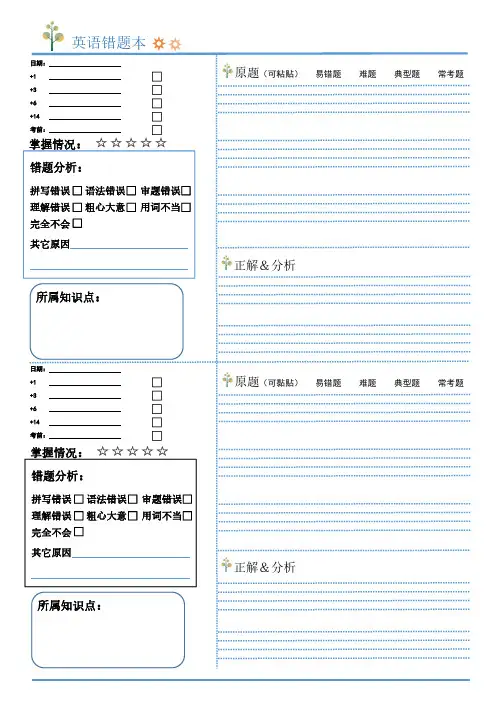
+1
+3
+6
+14
考前:
日期:+1
+3
+6
+14
考前:正解&分析
原题(可黏贴)易错题难题典型题常考题正解&分析
掌握情况:
错题分析:
拼写错误语法错误审题错误理解错误粗心大意用词不当完全不会
其它原因
所属知识点:
掌握情况:
错题分析:
拼写错误语法错误审题错误理解错误粗心大意用词不当完全不会
其它原因
所属知识点:
+1
+3
+6
+14
考前:
日期:+1
+3
+6
+14
考前:正解&分析
原题(可黏贴)易错题难题典型题常考题正解&分析
掌握情况:
错题分析:
拼写错误语法错误审题错误理解错误粗心大意用词不当完全不会
其它原因
所属知识点:
掌握情况:
错题分析:
拼写错误语法错误审题错误理解错误粗心大意用词不当完全不会
其它原因
所属知识点:。
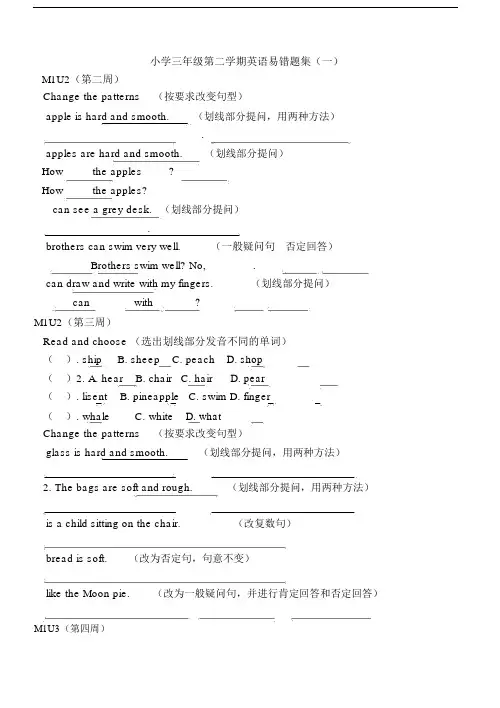
小学三年级第二学期英语易错题集(一)M1U2(第二周)Change the patterns(按要求改变句型)apple is hard and smooth.(划线部分提问,用两种方法).apples are hard and smooth.(划线部分提问)How the apples?How the apples?can see a grey desk.(划线部分提问).brothers can swim very well.(一般疑问句否定回答)Brothers swim well? No,.can draw and write with my fingers.(划线部分提问)can with?M1U2(第三周)Read and choose (选出划线部分发音不同的单词)(). ship B. sheep C. peach D. shop()2. A. hear B. chair C. hair D. pear(). lisent B. pineapple C. swim D. finger(). whale C. white D. whatChange the patterns(按要求改变句型)glass is hard and smooth.(划线部分提问,用两种方法)2. The bags are soft and rough.(划线部分提问,用两种方法)is a child sitting on the chair.(改复数句)bread is soft.(改为否定句,句意不变)like the Moon pie.(改为一般疑问句,并进行肯定回答和否定回答)M1U3(第四周)Fill in the blanks(用括号内所给词的适当形式填空))?( you)eyes. How the lemon(taste the(cake). How they(smell)?(be)some salt in the glass.4. There(be)any toys on the table.I have(some)pineapples ,please? Sure.6. Look at the whale.(it)tail is white.1.The lemon is sour.(划线部分提问,用两种方法)2.The lemons are sour.(划线部分提问)desk is hard.(划线部分提问,用两种方法)4. The desks are hard.(划线部分提问,用两种方法)5. The pineapple smells nice.(划线部分提问)6. The pineapples smell nice.(划线部分提问)7. I can touch with my hands.(划线提问)8. We can see grey.(划线提问)9. The boys like bread.(划线提问)10. The boy likes bread.(划线提问)can sing .Kitty can’t dance.(两句连成一句)M2U1(第五周)Fill in the blanks(读一读,根据句意填入合适的单词)1.you like dogs? , I don’t. I like.2.I ’m in the zoo. I can see and.3.What animals do friends like ?like pandas.4.at the monkeys.can ride.5.May I hats? Sure.6.We can see all of in the park.Change the patterns(按要求改变句型)1.I like lions.(划线部分提问)(一般疑问句肯定回答)2.It is a zebra.(改成复数句)3. There are some elephants in the zoo.(改成单数句)4. Jack is under the tree.(划线部分提问)5. I want a new hat.(划线部分提问)6. I want this hat .(否定句)7. 8.They are bulls.No, I don(根据回答写问句)’t like snakes.(根据回答写问句)M2U2(第六周)Fill in the blanks(任意填空)mother this book .interesting. is Wendy.Change the patterns(按要求改变句型)like skateboards.(有趣的)否定句:一般疑问句并肯定回答:对划线部分提问:2.Alice and Kitty like toy trains.否定句:一般疑问句并否定回答:对划线部分提问:brother likes toy cars.否定句:一般疑问句并肯定回答:对划线部分提问:have some robots.(用Uncle Bai代替I)skateboards are smooth.(划线部分提问,用两种方法)doll is ten yuan.(划线部分提问)M1U1~M1U3Choose the best answer(选择填空)1.can you see? I can see purple.A. WhatB. What colourC. How manyand Ben are at home. Look at. They are writing.A. theyB. themC. theirany birds sitting on the chair.A. areB. aren’ tC. isHow the lemons taste? ---- They’re sour.A. doesB. areC. doRead and fill in the blanks(用括号内所给词的适当形式填空)bag(be)big. It’s small.! Can you hear the ships? No, I can’ t hear(they).’ s friemds(have)got some(be)soft.the pineapple .It(be)smooth.5.( be)your friend tall? No,he(be).at(I )spinner. It’ s colorful.(五颜六色的)Read and write(用am, is, are, have, has, can的适当形式填空)1. What you see? I see.2. The plant long roots. It short roots.3.the pupils many books? No, they.4.A frog four legs. Two frogs eight legs.5.There some Moon bread in the supermarket.6.Touch the pineapple.it hard?Choose and fill in the blanks(选择下列词的适当形式填空,每词限用一次)eat at do it be in1.We want to buy some fruit. Now we are the fruit shop.2.Charlie wants to buy a toy whale the toy shop.3.Taste the plum .How it feel?4.Look at the whale.tail is white.5.Eddie likes pineapples.6.There any bread on the table.Change the patterns(按要求改变句型)1.The toys are soft and rough.(划线部分提问)the toys?2.The insects can fly with their wings.(划线部分提问)can the insects?3.Ben can run fast with his legs.(划线部分提问)Can Ben?4.I can use a toothpick.(一般疑问句)Can a toothpick.5.My father can see green.(划线部分提问)can father see ?is a blue kite.(划线部分提问)that?7.My sisters can run fast.(一般疑问句并否定回答)sisters run fast? No,can’t.8.We can see one child.(划线部分提问)can see ?9.The lemons are nice.(划线部分提问)the lemons?10. My brothers like sweets.(划线部分提问)brothers like?11. The salt is six yuan.(划部分提)the salt ?12. My sister can see white.(划部分提)can sister see ?M2U1~M2U3Read and jydge (判断音,用“√”或“×”表示)()1. plant plate()2. hand have ()3. cold hot()4. grass glass ()many()hearRead and choose (出不同的)()1. A. clever B. sit C. hop D. climb()2. A. his B. my C. our D. itRead and write(填入合适的介,可重复)’ s that English? It’ s a scarf.and Alice are the fruit shop.toy is my little brother.has got a pair new shoes.Choose the best answer(填空)1.---Is this cat?--- No,it’s cat.A. his , yourB. my, yourC. your, my2.There a monkey and some chicks sitting on the rock.A.are’tB. isC. are3.Look,Danny!Your are dirty.A. eyesB. handsC. nose4.Can the fat man make aeroplanes? Yes,can.A. fat manB. heC. I5.is that under the chair? my toy bear.A. What ⋯There isB. What ’s⋯It ’s⋯ It ’s6.Do you like these? Yes ,I do.A. trouserB. trousersC. a pair of trousers7.My friends like with the doll together.A. playingB. playsC. play8. I like tiger. I don’t like lions.A. these,thoseB. this , theseC. those, that9. That pair of shoes red and new.A. areB. isC. has10. Look at my trousers.new and blue.A. They ’reB. It’sC. Their11.in your hand? My red scarf.A. WhatB. What‘ sC. Where ’ sRead and write (用 am, is, are, have, has, can的适当形式填空)1.She a dog. Peter a dog, too. They both(都) dogs. colour the flowers、3.you all right ?I’m fine, thank you.4.What in the desk? There two books and some pencils.5.These children got a beautiful star. They very happy.Read and fill in the blanks(用括号内所给词的适当形式填空)monkeys are can ride(bicycle).many( fox ) are there in the zoo?One.at the boy’s(scarf).They are soft.(not like) these robots.Change the patterns(按要求改变句型)1. There is a child sitting behind the wall.(划线提问)are there sitting behind the wall?2. This is my dress.(改成复数句)are.3. Paul likes drawing pictures.(否定句)Paul pictures.4. My friends can sing well.(一般疑问句并否定回答)5. I can see one child.(划线提问)6. The pineapples are rough.(划线提问,两种方法)7. The bag is ten yuan.(划提)8. Kitty can run fast with her legs.(划提)期中复Read and fill in the blanks(用括号内所的适当形式填空)1.This hat(be) new. It’ s old.2.What colour are(you) eyes? They are black.3.Feel the(apple) .How do they feel?4.This plant is beautiful. It(have) three(leaf).5.Touch the pineapple. It(be) smooth. It(be) rough.Read and write(用 am, is, are, have, has, can的适当形式填空)1.the pupils any books? No,they.2. A frog four legs. Two frogs eight legs.3.There some Moon bread in the supermarket.4.The pencils long. They short.Choose the best answer(填空)1.---Is this cat ? ---No, it’s cat.A. his , yourB. my , yourC. your , my2.Is that under the chair?my toy bear.A. What ⋯ There isB. What’ s⋯ It ’sC. What ⋯It ’s3.That pair of shoes red and new.A. areB. isC. has4.Look at my trousers.new and blue.A. They ’ reB. It’sC. Their5.you plant tree in winter? No, we.A, Can ⋯ don’t⋯don’t C. Are⋯ aren ’ t6.In autumn, the wind and.A. blows ⋯blows⋯ blow C. blows⋯ blow7.I can my shoulders(肩膀) .A. touchB. openC. clap8.Children’s Day is a holidaychildren.A. toB. giveC. forRead and fill in the blanks(用括号内所给词的适当形式填空)1.Are you pupils? Yes,(I ) are.2.That ’s(I) aunt.(she) dress is beautiful.3.look at the boy’ s(scarf). They are soft.4.I( not like)these robots.5.The table( be)a square. It ’s a rectangle.6.Today is the(one)of October. It’ s our Nationnal Day. (国庆节)7.Can you draw(you) ? Yes, I can.Change the patterns(按要求改变句型)1.My sister can see purple and violet.(划线提问)can see ?2.The tigers can run fast with their strong legs.(划线提问)the tigers with?3.Linda and I are twelve.(划线提问)Linda and?4.My friends can plant trees.(一般疑问句并肯定回答)Can? Yes ,.5.I have some cakes for you.(一般疑问句)cakes?6.The tigers are big.(改为否定句,意思不变)tigers.7.This nice scarf is long.(改为复数句)long.8.My sister is nine.(划线提问)is?9.This is a long ruler. It is a triangle.(两句并一句)This‘10. Those books are rectangles.(划线提问)are?11. A triangle has three sides.(划线提问)has?12. We can touch with our hands.(划线提问)13. That tall man is our new teacher.(划线提问)that?3BM1 综合练习卷Choose the best answer(选择填空)1.Kitty and Ben are at home. Look at.They are writing.A. theyB. themC. their2.There any birds sitting on the chair.A. areB. aren’tC. isRead and fill in the blanks(用括号内所给的适当形式填空)1.This bag( be) big . It’s small.2.Kitty’s friends(have) got some bananas. They(be)soft.3.A frog( have) four legs. Two frogs(have)eight legs.4.There(be) some Moon bread in the supermarket.5.The plant( has)long roots. It( has)short roots.6.There( be)any bread on the table.Change the patterns(按要求改变句型)1.My sisters can run fast.(一般疑问句,并作否定回答)sisters run fast ? No ,can’t.2.We can see one child.(划线提问)can see ?3.The insects can fly with their wings.(划线提问)can the insects?3B revision for M1U1\2Read and fill in the blanks(用括号内所给的适当形式填空)1.Look at(I) spinner. It’s colorful.(五颜六色的)Read and write( 用 am, is, are, have, has, can的适当形式填空 )1.this your ruler? No, it.2.The pencils long. They short.3.The plant long roots. It short roots.4.the pupils many books? No ,they.5.I a good friend. Her name Kitty.6.There some Moon bread in the supermarket,1. My sisters can run fast.(一般疑句,并作否定回答)sisters run fast ? No ,can’t. Read and choose (出划部分音不同的)()1. A. listen B. swim C. finger D. pineapple3B合卷1 What’ s name? Ben .A. heB. hisC. her2 Uncle bai is tired. He wants to a rest under the tree.A. takeB. sitC. get3 Look at the monkey.tail is long.A. It’sB. ItC. Its按要求改句型1. His sister is nine.(2. This scarf is long.(划部分提改复数句 ))is his sister?long.在短文的空格内填入适当的,使其内容通,每空格填一,首字母已:This is They’re Min theSmith. He has two sons. Bob issame school. They like playingt.together.Jack isBob likestwelve,r.too.Jack likess.Their m is a teacher of English.She l her pupils very much.1. Uncie Bai many hats. But I only one hat.A. has ⋯haveB. have⋯haveC. has⋯haven’t2. How the apples taste?sweet.It s do They re They re3.I don’t like,but I like.A. sweets ⋯ sweet breadB. sweet⋯sweet breadC. sweets⋯sweet breads4.My robot has two legs. Itwalk.A. isB. likesC. can5.My hands are on the.A. hatB. scarfC. gloves下面的的适当形式填空,不得重复bicycle be they glass do1.Listen! Can you hear the ships? No , I can’t hear.2.Feel the. How do they feel? They are cold.3.Touch the pineapple. It smooth.4.How the pineapple taste? It is sweet.5.The monkeys are clever. They can ride.按要求改句型:1.My bag is soft.(划部分提 )bag?M2U3 (第七周)Fill in the blanks(用括号里的适当形式填空)1.The boys( have) a nice football.2.( be)these dresses ? No ,they(be) blouses.3.Some monkeys( take )the hats.Read and fill in the blanks(用 am, is, are, have, has,填空)1.Ia new classmate. Her name Sue. She a pink scarf.2.There a pair of shoes in the box. There two pairs of sockstoo.3.Eric a skateboard? Yes . It black.Change the patterns(按要求改句型)1.That ’s a nice scarf.(复数句)2.My classmates like the red hat.(一般疑句并否定回答)。
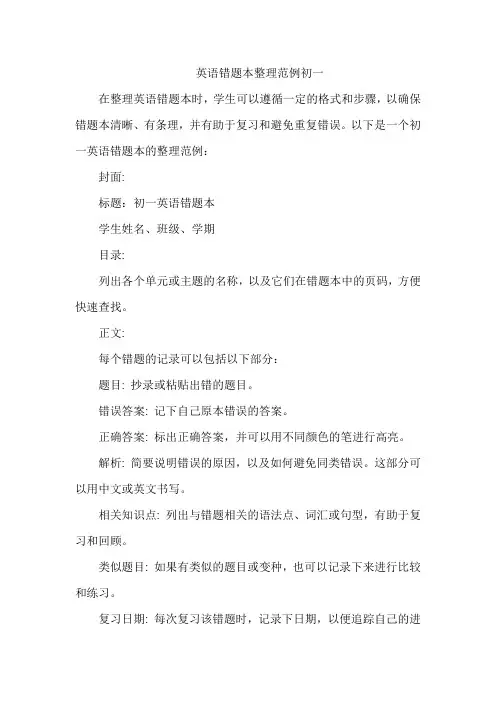
英语错题本整理范例初一在整理英语错题本时,学生可以遵循一定的格式和步骤,以确保错题本清晰、有条理,并有助于复习和避免重复错误。
以下是一个初一英语错题本的整理范例:封面:标题:初一英语错题本学生姓名、班级、学期目录:列出各个单元或主题的名称,以及它们在错题本中的页码,方便快速查找。
正文:每个错题的记录可以包括以下部分:题目: 抄录或粘贴出错的题目。
错误答案: 记下自己原本错误的答案。
正确答案: 标出正确答案,并可以用不同颜色的笔进行高亮。
解析: 简要说明错误的原因,以及如何避免同类错误。
这部分可以用中文或英文书写。
相关知识点: 列出与错题相关的语法点、词汇或句型,有助于复习和回顾。
类似题目: 如果有类似的题目或变种,也可以记录下来进行比较和练习。
复习日期: 每次复习该错题时,记录下日期,以便追踪自己的进步。
示例:Unit 1 - Greetings and Introductions页码: 1题目: Complete the sentence: Hello, my name is _______. Nice to meet you!错误答案: Hello, my name is I. Nice to meet you!正确答案: Hello, my name is John. Nice to meet you!解析: 在自我介绍时,应该使用名字而不是代词“I”。
相关知识点: 自我介绍的常用表达。
复习日期: XX/XX/XXXX, XX/XX/XXXX页码: 2题目: Choose the correct response: A: How are you? B: _______a) I'm fine, thank you.b) How do you do?c) Nice to meet you.错误答案: b) How do you do?正确答案: a) I'm fine, thank you.解析: “How are you?”的标准回答是“I'm fine, thank you.”而非“How do you do?”。
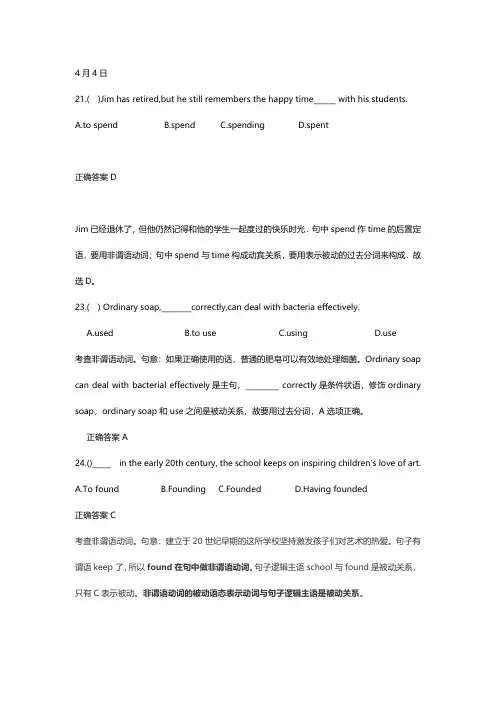
4月4日21.( )Jim has retired,but he still remembers the happy time______ with his students.A.to spendB.spendC.spendingD.spent正确答案DJim已经退休了,但他仍然记得和他的学生一起度过的快乐时光.句中spend作time的后置定语,要用非谓语动词;句中spend与time构成动宾关系,要用表示被动的过去分词来构成.故选D。
23.( ) Ordinary soap,________correctly,can deal with bacteria effectively.edB.to useinge考查非谓语动词。
句意:如果正确使用的话,普通的肥皂可以有效地处理细菌。
Ordinary soap can deal with bacterial effectively是主句,_________ correctly是条件状语,修饰ordinary soap,ordinary soap和use之间是被动关系,故要用过去分词,A选项正确。
正确答案A24.()_____ in the early 20th century, the school keeps on inspiring children's love of art.A.To foundB.FoundingC.FoundedD.Having founded正确答案C考查非谓语动词。
句意:建立于20世纪早期的这所学校坚持激发孩子们对艺术的热爱。
句子有谓语keep了,所以found在句中做非谓语动词。
句子逻辑主语school与found是被动关系,只有C表示被动。
非谓语动词的被动语态表示动词与句子逻辑主语是被动关系。
25.()The policeman put down the phone,____with a smile on his face.A .satisfied B.satisfying C.to be satisfied. D. being satisfied正确答案AA项表示"感到满意的",修饰人;B项表示"令人满意的",修饰物;C项表示将来或目的;D项表示正在进行.be satisfied with对…感到满意;形容词短语在句中作定语、状语或补足语时省略系动词be.句意:那个警察放下电话,脸上带着满意的笑容.故选:A.26. _____himself_____the project,the manager worked day and night.A.Applying;inB.Applying;toC.Applied;inD.Applied;to正确答案B首先分析第一个空格,“_____himself”作为句子的状语,描述经理工作的状态,是经理主动把自己应用于项目,因此应使用主动形式。
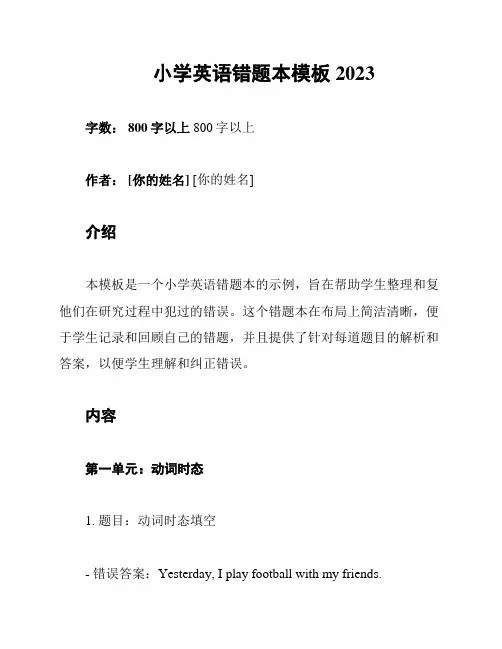
小学英语错题本模板2023字数: 800字以上 800字以上作者: [你的姓名] [你的姓名]介绍本模板是一个小学英语错题本的示例,旨在帮助学生整理和复他们在研究过程中犯过的错误。
这个错题本在布局上简洁清晰,便于学生记录和回顾自己的错题,并且提供了针对每道题目的解析和答案,以便学生理解和纠正错误。
内容第一单元:动词时态1. 题目:动词时态填空- 错误答案:Yesterday, I play football with my friends.- 解析:play应改为played,表示过去的动作。
- 正确答案:Yesterday, I played football with my friends.played football with my friends.2. 题目:选择正确的动词时态- 错误答案:He will go to the cinema tomorrow.- 解析:will go表示将来的动作,应改为went表示过去的动作。
- 正确答案:He went to the cinema yesterday.went to the cinema yesterday.第二单元:名词单复数1. 题目:选择正确的名词单复数形式- 错误答案:I have two dog.- 解析:dog应改为dogs,表示复数形式。
- 正确答案:I have two dogs.dogs.2. 题目:填入正确的名词单复数形式- 错误答案:There are many sheeps in the field.- 解析:sheeps应改为sheep,表示单数形式。
- 正确答案:There are many sheep in the field.sheep in the field.第三单元:形容词比较级1. 题目:填入正确的形容词比较级形式- 错误答案:The elephant is more big than the mouse.- 解析:big应改为bigger,表示更大的比较级。
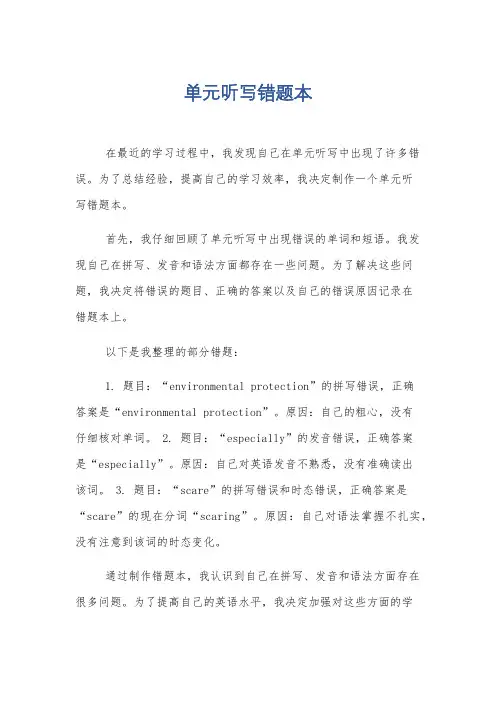
单元听写错题本
在最近的学习过程中,我发现自己在单元听写中出现了许多错误。
为了总结经验,提高自己的学习效率,我决定制作一个单元听
写错题本。
首先,我仔细回顾了单元听写中出现错误的单词和短语。
我发现自己在拼写、发音和语法方面都存在一些问题。
为了解决这些问题,我决定将错误的题目、正确的答案以及自己的错误原因记录在
错题本上。
以下是我整理的部分错题:
1. 题目:“environmental protection”的拼写错误,正确
答案是“environmental protection”。
原因:自己的粗心,没有
仔细核对单词。
2. 题目:“especially”的发音错误,正确答案
是“especially”。
原因:自己对英语发音不熟悉,没有准确读出
该词。
3. 题目:“scare”的拼写错误和时态错误,正确答案是“scare”的现在分词“scaring”。
原因:自己对语法掌握不扎实,没有注意到该词的时态变化。
通过制作错题本,我认识到自己在拼写、发音和语法方面存在很多问题。
为了提高自己的英语水平,我决定加强对这些方面的学
习,并定期复习错题本上的内容。
我相信在不断总结经验和努力下,自己的英语水平会不断提高。
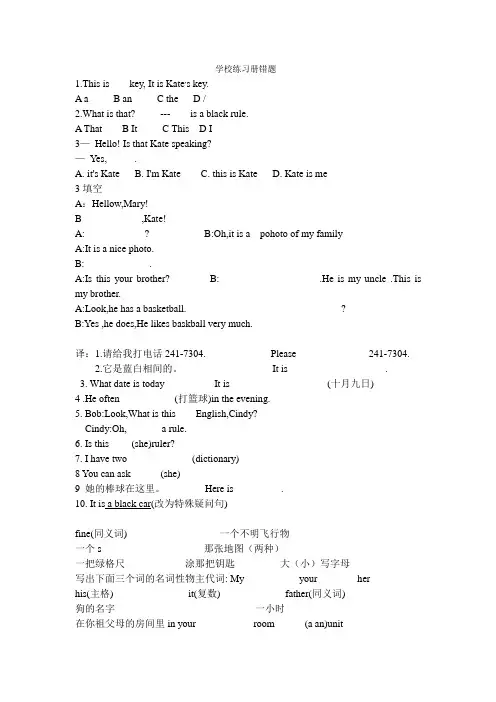
学校练习册错题1.This is ___ key, It is Kate,s key.A aB anC theD /2.What is that? ---____is a black rule.A ThatB ItC ThisD I3—Hello! Is that Kate speaking?—Yes, _____.A. it's KateB. I'm KateC. this is KateD. Kate is me3填空A:Hellow,Mary!B____________,Kate!A:____________? B:Oh,it is a pohoto of my familyA:It is a nice photo.B:_____________.A:Is this your brother? B:____________________.He is my uncle .This is my brother.A:Look,he has a basketball._______________________________?B:Yes ,he does,He likes baskball very much.译:1.请给我打电话241-7304. Please ______________241-7304.2.它是蓝白相间的。
It is ___________________.3. What date is today It is ___________________(十月九日)4 .He often___________(打篮球)in the evening.5. Bob:Look,What is this____English,Cindy?Cindy:Oh,_______a rule.6. Is this ____(she)ruler?7. I have two_____________(dictionary)8 You can ask______(she)9 她的棒球在这里。
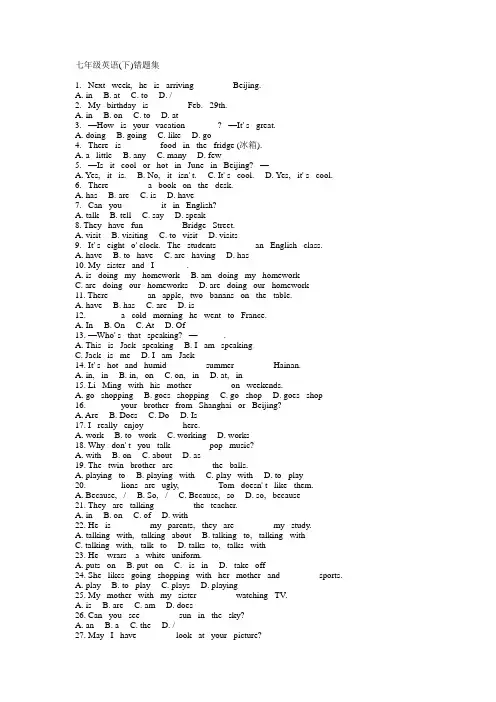
七年级英语(下)错题集1. Next week, he is arriving ______ Beijing.A. inB. atC. toD. /2. My birthday is ______ Feb. 29th.A. inB. onC. toD. at3. —How is your vacation ______? —It' s great.A. doingB. goingC. likeD. go4. There is ______ food in the fridge (冰箱).A. a littleB. anyC. manyD. few5. —Is it cool or hot in June in Beijing? —______A. Yes, it is.B. No, it isn' t.C. It' s cool.D. Yes, it' s cool.6. There ______ a book on the desk.A. hasB. areC. isD. have7. Can you ______ it in English?A. talkB. tellC. sayD. speak8. They have fun ______ Bridge Street.A. visitB. visitingC. to visitD. visits9. It' s eight o' clock. The students ______ an English class.A. haveB. to haveC. are havingD. has10. My sister and I ______.A. is doing my homeworkB. am doing my homeworkC. are doing our homeworksD. are doing our homework11. There ______ an apple, two banans on the table.A. haveB. hasC. areD. is12. ______ a cold morning he went to France.A. InB. OnC. AtD. Of13. —Who' s that speaking? —______.A. This is Jack speakingB. I am speakingC. Jack is meD. I am Jack14. It' s hot and humid ______ summer ______ Hainan.A. in, inB. in, onC. on, inD. at, in15. Li Ming with his mother ______ on weekends.A. go shoppingB. goes shoppingC. go shopD. goes shop16. ______ your brother from Shanghai or Beijing?A. AreB. DoesC. DoD. Is17. I really enjoy ______ here.A. workB. to workC. workingD. works18. Why don' t you talk ______ pop music?A. withB. onC. aboutD. as19. The twin brother are ______ the balls.A. playing toB. playing withC. play withD. to play20. ______ lions are ugly, ______ Tom doesn' t like them.A. Because, /B. So, /C. Because, soD. so, because21. They are talking ______ the teacher.A. inB. onC. ofD. with22. He is ______ my parents, they are ______ my study.A. talking with, talking aboutB. talking to, talking withC. talking with, talk toD. talks to, talks with23. He wrars a white uniform.A. puts onB. put onC. is inD. take off24. She likes going shopping with her mother and ______ sports.A. playB. to playC. playsD. playing25. My mother with my sister ______ watching TV.A. isB. areC. amD. does26. Can you see ______ sun in the sky?A. anB. aC. theD. /27. May I have ______ look at your picture?A. aB. anC. theD. /28. ______ water is ______ liquid (液体).A. The, aB. A, aC. /, /D. /, a29. We are going to have ______ X-ray (X 光片) check.A. aB. anC. theD. /30. Won' t you have ______ cold drink in such hot weather?A. aB. anC. theD. /31. There is ______“s”in the word“six”and______“s”is the first letter of the word.A. a, theB. a, anC. an, theD. a, a32. He was in ______ hurry (匆忙) to catch (赶) ______ train (火车).A. a, /B. a, theC. the, /D. a, a33. She has ______ same coat as my sister.A. anB. aC. /D. the34.______ Changjiang River is ______ longest in ______ China, and are of ______ longest rivers in ______ world.A. The, the, /, /, theB. /, the, /, the, /C. /, the, /, the, theD. The, the , /, the, the35. ______ Chens (陈姓一家) will come to see you tomorrow.A. AB. AnC. /D. The36. Beijing is ______ capital of our country.A. theB. anC. /D. a37. —Do you like to play computer games?—______. It' s fun.A. Yes, I amB. Yes, I doC. No, I don' t38. I can' t find the key ______ the door.A. atB. ofC. forD. to39. Here is an e-mail ______ Lily ______ her pen pal in the USA.A. to, forB. from, toC. between, fromD. with, to40. It' s fun ______ physics; it' s one of my favorite ______.A. to study, subjectB. study, subjectC. studying, subjectD. to study, subjects41. Let' s make ______.A. friendB. a friendC. two friendsD. friends42. He asks me ______ there for dinner.A. goB. goesC. to goD. going43. Jack and John enjoy ______ sports with their friends.A. to playB. playC. playsD. pllaying44. She likes ______ to the movies ______ her friends.A. go, withB. going, withC. goes, withD. going and45. Could you ______ that in English?A. sayB. speakC. talkD. speak to46. My brother works five days ______ week.A. theB. aC. in aD. on the47. Anna is from Sydney, ______ she can speak Chinese.A. andB. butC. soD. or48. Do they have ______ cousins?A. aB. someC. anyD. an49. —Would you like ______ cakes? —Yes, please.A. someB. anyC. aD. much50. Could you ______ this word in French?A. speakB. sayC. tellD. talk51. I want to buy ______ bananas.A. a littleB. littleC. fewD. a few52. Anna ______ I go to school together (一起).A. isB. andC. orD. with53. Who does your sister ______?A. liveB. live inC. lives inD. live with54. —Do you have a ruler? —No, I don' t have ______.55. Christmas Day is ______ December 25th.A. inB. onC. forD. at56. ______ is the way to the bank?A. WhereB. How longC. WhichD. How for57. Go straight ______ this street and then turn right.A. fromB. toC. downD. on58. —Let me tell you the way ______ the airport. —Thank you.A. toB. onC. inD. at59. My seat is between ______ in the classroom.A. Tom and JimB. Tom and Jim' sC. Tom' s and Jim' sD. Tom' s and Jim60. They have great fun ______ Bridge Street.A. in visitingB. to visitC. visitD. in visit61. He has a ______ of six.A. homeB. houseC. roomD. family62. He is running ______ the road (路).63. Look right and left before you ______ the street.A. throughB. acrossC. passD. cross64. Our teacher is standing ______ the blackboard.A. in front ofB. inC. onD. in the front of65. Betty arrived ______ London ______ the evening of June 1st.A. at, inB. at, onC. in, inD. in, on66. —Will you get there by ______ train? —No, I' ll take ______ taxi.A. /, aB. a, theC. /, /D. the, a67. —Excuse my. Could you tell me ______?—There' s a bank on the second floor. You can make it there.A. where I can change moneyB. how I can get to the bankC. if there' s a bank near hereD. where the bank is68. Hello, 5781431. ______ Mike.A. I amB. You areC. Are youD. This is69. Oh! ______ is my sister, Kate.A. HersB. HerC. She' s That70. —Is Kate ______ school today? —No, I think she is ______ home.A. in, inB. at, atC. at, inD. in, at71. My book is ______ the table. I can' t see it.A. onB. forC. atD. under72. —Where' s my backpack? —______ on the chair.A. They areB. It' sC. Is itD. I' m73. —What' s under the desk? —It looks ______ a cat.A. likeB. afterC. atD. I' m74. ______ is the way to the bank?A. WhereB. How longC. WhichD. How far75. —Who' s the man ______ black? —He' s Mr White.A. inB. withC. onD. of76.Mr Green got _____ the bus at the bus stop near the supermarket then he went home______ foot. A. on, by B. to, on C. off, on D. off, by77. Some shops open ______ 10: 00 am and 3:30 pm during the Spring Festival holidays.A. atB. fromC. aboutD. between78. Our English teachers come ______ England.A. atB. onC. ofD. from79. People swim ______ the river ______ summer.A. in, inB. at, inC. at, atD. in, at80. —Would you like some tomatoes? —______A. I' d like some apples.B. No, please.C. Yes, please.D. OK!81. I don' t like bananas ______ oranges.82. Some beef ______ in the bag.A. is, areB. are, isC. are, areD. is, is83. I' d like ______ some ______.A. to have, saladsB. have, saladsC. have, saladD. to have, salad84. How ______ beef ______ there in the fridge (冰箱).A. many, isB. much, isC. much, areD. many, are85. It was time to play sports.A. with sportsB. for sportsC. after sportsD. having sports86. Tony' s weekend was great.A. wellB. OKC. deliciousD. successful87. I ______ many interesting people and answer their questions.A. workB. meetC. studyD. look88.—Please write to me when you have time. —Sure. But ______ is your e-mail ad dress?A. whenB. whereC. whatD. which89. I have a lot of ______ to do every day.A. workB. jobC. worksD. jobs90. The boy is old enough to ______ himself.A. put onB. wearC. inD. dress91. Today my mother ______ a blue coat.A. puts onB. wearsC. inD. dresses92. She often reads a book for ______ to find out the main ideas.A. sometimeB. sometimesC. some timeD. some times93. I stay with my grandparents for ______ every year.A. sometimeB. sometimesC. some timeD. some times94. My uncle is a doctor. He works ______.A. in hospitalB. in a hospitalC. in hospitalsD. in an hospital95. There are many doctors and nurses ______. They all work hard.A. in hospitalB. in a hospitalC. in hospitalsD. in the hospital96. —What' s in your bag? —There' s ______ English book in it.A. aB. anC. theD. /97. Doctors and nurses ______ white uniforms when they are at work.A. wearB. wearsC. put onD. puts on98. It' s eight o' clock . The students ______ an English class.A. haveB. to haveC. are havingD. has99. Listen! Mr White ______ Jim.A. talk aboutB. is talking toC. talk withD. is talking100. Who' s he ______?A. waitingB. waiting forC. waitting forD. is waiting101. Thanks for ______ us so much help.A. givingB. giveC. givesD. to give102. My sister and I ______.A. is doing my homeworkB. am doing my homeworkC. are doing our homeworksD. are doing our homework103. A ______ is helping him with the work.A. womenB. menC. peopleD. person104. We need one more ______ to do the work.A. peopleB. personC. menD. women105. —Who is singing in the classroom? —______ must be Susan.A. SheB. ItC. ThisD. He106. Do you know the man ______ is sitting behind Nancy?A. whatB. whichC. whoD. whom107. —What are you doing, Lucy? —I' m ______ my cat; I can' t find it.A. looking forB. looking atC. looking upD. looking after108. Listen! Grandma is ______ a story to the boy.A. tellingB. sayingC. talkingD. speaking109. Nancy with her friends ______ now.A. playB. playsC. is playingD. are playing110. The snow is very ______.A. heavyB. heavilyC. smallD. big111. Who is the young woman ______ the sunglasses.A. inB. hasC. wearD. with112. Listen! Can you hear her ______ in her room?A. singB. to singC. singingD. is singing113. Mall is a good place ______ things.A. buyB. to buyC. buysD. to buying114. ______ late for school next time.A. Don' tB. Don' t beC. Can' t beD. Be not115. ______ call me Mimi. It' s my cat' s name.A. NotB. Didn' tC. Doesn' tD. Don' t116. ______ come in, please.A. DoB. DidC. WillD. Isn' t117. —Let' s go to the movies, ______? —OK. Let' s go.A. will youB. won' t youC. shall weD. shall you118. ______ worry. He can help you.A. Can' tB. Doesn' tC. Don' tD. Aren' t119. Never ______ till tomorrow what you can do today.A. put downB. put offC. put onD. put in120. ______ the windows well before ______ to bed.A. Close, goB. Close, goingC. Closing, goD. Closing, going121. It' s so late. Why ______ now?A. not goB. no goingC. don' t goD. not to go122. ______ worry, I can help you.A. Can' tB. Doesn' tC. Don' tD. Aren' t123. He ______ carefully but ______ nothing.A. listen, hearB. listened, heardC. listens to, listens toD. heard, heard 124. Don' t get off the the bus ______ it has stopped.A. untilB. ifC. toD. for125. Remenber to ______ me your photos.A. bringB. takeC. getD. carry126. It' s going to rain. Please ______ an umbrella (雨伞) with you.A. takeB. bringC. getD. carry127. The boy is too young to ______ the heavy bag.A. takeB. bringC. getD. carry128. There is little water in the bottle. Please go and ______ some.A. takeB. bringC. getD. carry129. I can' t hear the radio clearly (清楚的). Please ______.A. turn on itB. turn it onC. turn up itD. turn it up130. Don' t forget (忘记) to ______ the light when you leave the room.A. turn onB. turn offC. turn upD. turn down131. —Do you know ______ the workers in the factory? —It' s about 100.A. the numberB. the number ofC. a number ofD. a number132. There are ______ people in the supermarket.A. too manyB. too muchC. much tooD. a lot133. Tony ______ look after his little brother on Sundays.A. have toB. isC. has toD. do134. The sign (标记) “______!” means that people can' t talk here.A. Turn leftB. No talkingC. No foodD. photos135. ______ classroom is big. How about ______?A. Our, yourB. Ours, yoursC. Your, theirsD. Yours, their136. Don' t play computer games now, ______?A. do youB. will youC. can youD. shall you137. All the students must go to school ______ uniform.A. inB. onC. withD. wear138. There is no time ______ lunch at home.A. haveB. hasC. to haveD. having139. Why ______ take off your coat? It' s too hot in the room.A. don' tB. notC. not toD. not you140. Thanks for joining us.A. comingB. being a member ofC. take part inD. going into141. I enjoyed reading yuour article.A. hatedB. wantedC. liked very muchD. practiced142. It' s 12 o' clock. The Green fanily are having lunch.A. The Green' s familyB. The GreensC. GreensD. The Green' s143. I called you last night but you weren' t in.A. askedB. toldC. shoutedD. phoned144. Thanks ______ joining us.A. much ofB. a lot of foC. a lot forD. you of145. —How do you like the TV play? —______A. It' s wonderful.B. What about you?C. Yes, I like it.D. No, I don' t like it at all.146. —What do you think of the music, Fred? —It ______ wonderful.A. smellsB. looksC. tastesD. sounds147. Two ______ workers work in the factory.A. hundredB. hundred ofC. hundredsD. hundreds of148. My uncle won ______ dollars in the lottery (抽奖). How lucky he was!A. five millionB. five million ofC. five millions ofD. million of149. They planted ______ trees in the park.A. two thousandsB. thousand ofC. two thousand ofD. thousands of150. My brother likes to ______ soup.A. takeB. hasC. eatD. eats151. She ______ the plan you said in the meeting.A. agree withB. agree toC. agreed toD. agreed with152. There are many trees on ______ side of the street.A. eachB. everyC. bothD. all153. —How about going for a walk outside? —______.A. I would beB. I likeC. I doD. I' d like to154. I don' t think ______ you are a worker.A. whatB. thatC. whyD. who155. —It' s very hot today. —______. But it' s cooler tomorrow, I think.A. You' re rightB. It doesn' tC. I' m sorry to hear thatD. You' re wrong156. I think ______ is for moms.A. washB. washesC. washingD. to wash157. Tom' s father enjoyed ______ Beijing Opera.A. listeningB. to listenC. listening toD. to listen to158. My mother told me she would come back ______ the night of July 16th.A. onB. atC. inD. about159. Yesterday I helped him ______ the housework.A. doB. doesC. didD. doing160. David ______ a bad cold two days ago. He is much better now.A. is havingB. hasC. will haveD. had161.—Who told you to clean the windows? —Father ______. He said they are too d irty.A. toldB. didC. had toldD. tells162. You can ______ a bus to get there.A. takeB. onC. inD. by163. Lucy often goes to school ______ her father' s car.A. takeB. onC. inD. by164. ______ interesting book it is!A. WhatB. What anC. HowD. How a165. ______ hard they are working in the field!A. WhatB. What aC. HowD. How a166. Mr Smith is planting a tree ______ the corner of the house.A. inB. atC. aboutD. to167. Lucy often ______ on weekends.A. make the cookingB. does some washingC. makes the shoppingD. do some cooking168. ______ rich should help ______ poor.A. A, aB. A, theC. The, aD. The, The169. There are many ______ in the library.A. kinds of booksB. kind of bookC. kind of booksD. kinds of book170. —Did you enjoy your stay in Suzhou? —Yes, I had ______ great fun.A. aB. anC. theD. /171. —When did you come to this city? —______.A. Two years beforeB. Two years agoC. For two yearsD. After two years 172. ______ you have a good time at the party?A. DidB. DoC. WereD. Was173. Tom met an old friend ______ yesterday.A. in his way homeB. on his way to homeC. on his way homeD. in his way to home174. Mr Smith gave us a report ______ Chinese history.A. inB. onC. ofD. for175. Mike has two coats. One is red, ______ is blue.A. otherB. the otherC. anotherD. the others176. I heard a little boy ______ English.A. readingB. readsC. to readD. is reading177. A little boy was lost and I helped him ______ his father.A. findingB. findC. foundD. finds178. —Hello, may I speak to Miss Smith? —I' m sorry; she left here ______.A. just nowB. now and thenC. right nowD. from now on179. —______ are the people in your hometown? —They are friendly.A. HowB. WhatC. How aboutD. Who180. I didn' t know he came back ______ I met him in the street.A. sinceB. whenC. untilD. after181. —Where did you go after we left the library yesterday?—I went downtown and ______ my aunt on my way home.A. played withB. called atC. waited for C. waited after182. Mary, ______ in bed.A. not readB. don' t readC. no readD. looked after183. Could you send me ______ to tell me something about your visit in Amrica?A. a ticketB. an e-mailC. a TV setD. a watch184. I ______ my pen everywhere and I finally ______ it on the floor.A. looked for, foundB. found, found outC. found out, foundD. looked for, found out185. Jenny ______ a wallet lying on the ground.A. looked forB. found forC. foundD. found out186. Please ______ what time the train will arrive.A. findB. find outC. tookD. spent187. The sweater ______ me thirty yuan.A. paidB. costC. tookD. spent188. My brother ______ three hours doing his homework.A. costB. spentC. paidD. took189. I ______ five yuan for this pen.A. costB. tookC. paidD. spent190. It ______ me half and hour to get to the airport.A. tookB. costC. paidD. spent191. We had a great time ______ last weekend.A. inB. onC. atD. /192. What did you do ______ the evening of Friday?A. inB. onC. atD. for193. I practiced ______ English every day last year.A. readB. readingC. to readD. readed194. ______ you ______ volleyball after class yesterday?A. Did, playB. Did, playedC. Do, playD. Do, played195. The boy ______ to the mountains and forgot to do his homework.A. goB. wentC. goesD. going196. It' s ______ orange. But I want to eat ______ orange.A. an, anB. an, /C. /, anD. /, /197. —Would you like to have another cup of tea? —Yes, ______.A. I would like toB. I would likeC. I would loveD. I would want198. What about something ______?A. drinkB. drinkingC. to drinkD. drinks199. —______? —Yes, I want to buy some flowers for my mom.A. Can I help youB. Can you help meC. Are you OKD. Do you like it 200. —Look! The man at the gate ______ be our headmaster (校长). He is always standing there every morning. —No, it ______ be him. He is holding a meeting in the office now.A. must, can' tB. must, mustn' tC. can, can' tD. can, mustn' t201. There are some pictures ______ the wall.A. ofB. atC. onD. in202. there is a bank ______ the end of the street.A. atB. ofC. onD. in203. I' d like someone ______ me with my English.A. helpingB. helpC. to helpD. helps204. —Lucy and Lily, help ______ to some pizza. —Thank you.A. youB. yourC. yourselfD. yourselves205. How ______ green tea ______ there in the glass?A. much, isB. many, isC. much, areD. many, are206. —Would you like to come for dinner this Sunday, Xiao Ming? —______.A. I' d love to, but I' m too busy to comeB. Oh, no. That' ll be too tiredC. I' ll stay at homeD. Yes, please207. —What would you like ______ pizza? —Onions, please.A. toB. inC. withD. on208. There ______ some chicken on the table.A. areB. haveC. isD. has209. This is a ______ day in the history of our country.A. specialB. speciallyC. especiallyD. ordinary210. —Do you ______ her? —Yes, she was my neighbor when I was in Hunan.A. likeB. rememberC. agree withD. think211. The girl wears ______ and has ______ hair.A. glasses, long curlyB. glass, long curlyC. glasses, curly longD. glass, curly long212. Zhao Wei is really good-looking. She is ______ in China.A. loveB. popularC. beautifulD. good213. —Who' s the woman ______ blonde hair? —Oh, it' s Cathy' s mother.A. hasB. withC. wear C. of214. —Do you like this pop singer? —No, nobody in my class ______ her.A. likeB. likesC. likingD. to like215. —Is there ______ in the classroom? —No, there is ______ in it.A. somebody, nobodyB. anybody, somebodyC. anybody, nobodyD. somebody, anybody216. This pair of shoes ______ white.A. beB. isC. areD. has217. He is thirsty. Please give him some ______ to drink.A. riceB. meatC. waterD. oranges218. Lucy is a ______ girl. You can always see a smile on her face.A. busyB. happyC. serious (严肃的)D. crazy (疯狂的)219.—What does your cousin look like now? —Oh, he is much ______ than before.A. strongB. strongerC. strongestD. too strong220. You must remember ______ the book here.A. bringB. bring toC. bringingD. to bring221. I remember ______ asked her to write to us.A. haveB. havingC. to haveD. has222. Ann asked us to stop ______ and listen to her.A. talkB. talksC. talkingD. to talk223. Nancy and Julia are singing suddenly (突然地) they stop ______.A. danceB. dancingC. dancesD. to dance224. I want to drink ______ orange.A. a fewB. littleC. a bitD. a bit of225. What do you enjoy ______?A. listeningB. listening toC. to listen toD. listen226. My hair is long but ______ is short.A. yourB. sheC. herD. hers227. Don' t tell jokes ______ me.A. inB. onC. forD. of228. The man ______ is , my sister' s science teacher.A. with beardB. has heardsC. has a beardD. with a beard229. Remember ______ the door and the window when you leave.A. openB. openingC. to closeD. closing230. The rock singer with long curly hair is nearly two meters ______ height.A. onB. aboutC. inD. for231.They are going to give a fashion show. They are _____ some clothes from the 1 990s.A. putting onB. put onC. wearingD. wear232. You ______ about the future (将来) now.A. doesn' t thinkB. aren' t thinkC. don' t thinkingD. are thinking233. The children are ______ the volleyball game.A. talking withB. talking toC. talking aboutD. talk234. Our teacher is ______ a green shirt today.A. put onB. wearingC. putting onD. wear235. Everyone ______ a lot of fun now.A. haveB. havingC. is havingD. wear236. Thank you for ______ me to your birthday party.A. inviteB. invitedC. invitingD. to invite237. There are some sheep ______ the house.A. in the front ofB. in front ofC. on front ofD. in the middle238. I really don' t ______ see me.A. her wantB. want to herC. her want toD. want her to239. —_____ terrible weather it is! —The radio says that it' ll get _____ later in the day.A. What a, badB. What, worseC. How, badD. How a, worse240. —What' s the weather like this summer? —It' s ______ than last summer.A. hotB. too hotC. the hottestD. hotter241. There are seven books on the desk. Two are mine. ______ are all Tom' s. A. other B. the other C. others D. the others242. —I don' t like the color. Could you show me _____ one? —Certainly. Here you are.A. otherB. the othersC. anotherD. others二、词形变换和完成句子1. __________________ (有) some broccoli in the bowl.2. ____________ (be) there a table and two chairs in the room?3. What ____________ (be) your roommates' telephone number?4. I found a set of ____________ (key).5. David and Peter join a _______________ club. they are good _______________ (swim).6. I like music. I want to be a __________________ (music).7. Come to the shop and see for _______________ (you)8. He often ____________ (play) football after school.9. My mother often ____________ (go) shopping.10. There ____________ (be) a little girl over there.11. Mrs Li is from Australia. We all like ____________ (she).12. Thanks for ____________ (ask) me.13. My brother likes music, but he _____________ (like) art.14. You go through ______________ (eight) Avenue, then turn left.15. This is my bicycle and that are is ____________ (you).16. The boy is ________________ (interest) in watching football games.17. Look! The boys ____________________ (play) games in the park.18. Let' s ___________ (talk) about the movie.19. We all want ______________ (go) to the movies this weekend.20. Her grandpa is seventy-eight years old, and he is very ____________. (幸福)21. Don' t make the boy ____________ (study) too late at night.22. I' m _______________ (interst) in Beijing Opera.23. It' s their time _________________ (visit) the Summer Palace.24. It ____________ (rain) a lot in my hometown last year.25. I had great fun ____________ (play) in the water last Sunday.26. My sister usually ______________ (practice) her English in the morning.27. I like some _____________ (orange); I' m thirsty.28. I can ____________ (hard) hear you; please speak loudly.29. Let' s give the children something ________________ (diffierence) to drink.30. One of the girls __________ (be) of medium build.31. Look! Sam and Tom ____________________ (run) on the playground.32. It __________ (rain) a lot in my hometown every year.33. My mother decided _______________ (go) shopping this evening.34. When I went into the room, I found my sister _____________ (watch) TV there.35. I ____________________ (do) my homework now.36. Thank you for _____________ (come) to see me.37. The people are really very _______________ (relax).38. ____________________ (not take) the book. It' s not yours.39. But everyone __________ (be) here.40. The twin (双胞胎之一) _____________ (speak) English.41. __________ the boys __________ (play) tennis every day.42. __________ Li Ping and Wang Hai usually __________ (have) dinner at home.43. You ____________________ (not take) a shower at 5: 30.44. __________ she __________ (do) her homework all night.45. Jack __________ (love) his country very much.46. He often ___________ (play) football after school.47. I ____________________ (not have) any pears. But Mary __________ (has) some.48. He is ten __________ (year) old. __________ (he) favorite subject is PE.49. My mother __________ (go) shopping in the morning50. __________ (we) books are here. ____________ (they) books are there.51. I like __________ (we) English teacher. ________ (she) is from Shanghai.52. Mrs Li is from Australia. We all like __________ (she).53. I don' t like going with __________ (they).54. Garden Street is a good place ________________ (have) fun.55. You go through ____________ (eight) Avenue, then turn left.56. My father and mother enjoy _______________ (wath) TV.57. We didn' t go to the park yesterday, because it was a __________ (rain) day.58. Would you mind _______________ (close) the window?59. Her mother _____________ (buy) her a beautiful watch last week.60. The man spent 15 minutes (分钟) finishing _______________ (draw) the picture.61. I' m 12 years old and today is my ____________ (twelve) birthday.。
要求:
一,错题档案一律用三色笔整理:
黑色——抄题目
蓝色——正确的答案、解题思路、这道题的知识点等
红色——用来旁注:自己需要注意的小细节、常犯的错误、另一种解法等二,还需要做到
1,定期回顾
, 之所以出错,大多因为知识点不扎实,所以对待错误要经常“见面”。
2、及时清理
本上的题目反复看过,确实已经彻底掌握了,可以把题号做标记,再看的时候可以略过这些做了标记的题目
3、拓展内容
除了错题以外,可以记载一些考察知识全面、解题灵活多样的“好题”,把解题的思路、涉及到的知识点以及多种方法汇总到一起,这也是知识升华的过程备注:
Date(日期):No.(编号)Source(来源)
□homework(作业)□refence book (参考书)□test papper(试卷)
□others(其它)
Knowledge points (知识点) Questions &wrong answers (问题及错误答案) Correct answer (正确答案)
Analysis (分析)
**
酒店订房协议书
NO :
甲方:** 酒 店 (以下简称甲方) 乙
方
: (乙下简称乙方) 签
订
日
期
: 签订日期:
甲方本着顾客至上的原则,与乙方协定在甲方客房、餐厅消费有关约定:
一、 乙方在签约期内,甲方给
予乙方客房以下优惠价格
(以下价格均为净价、人民币报价):
1、10人以上可组成团队,享受团对协议价。
1、I’d like you for a picnic with us.A、goB、to go c、going D、went2、Everyone I come from Sichuan Actually, I come from Shandong.A、findB、thinkC、findsD、thinks3、Who would you like to play , Mary or Kate?A、 toB、withC、onD、for4、There are water on the floor. Please be careful.A、 so manyB、much soC、many soD、so much5、Who are you ? —My young brother.A、 waitingB、waiting forC、waitD、waits6、You are . What are you doing ?A、 quiet,quietlyB、quiet, quietC、quietly, quietlyD、quietly,quiet7、Don’t worry. I’m trying to a hotel.A、listenB、findC、lookD、look out8、—will we go to the Tian’anmen Square? —Let’s walk there.A、WhatB、HowC、WhenD、Where9、We are all ready the class.A、toB、forC、atD、with10、I the blackboard, but I can’t a word on it.A、see,seeB、look; look atC、look at; seeD、see; look at11、There are a lot of place in Beijing. For example,the Great Wall is a place of .A、interesting;interestedB、interest; interestingC、interested; interestingD、interesting; interest12、My birthday is May 15 th and my brother’s birthday is June.A、on; inB、in; onC、at; onD、on; at13、Don’t forget me tomorrow.A、callB、callingC、to callD、calls14、—you the radio? — No,you can turn it off.A、Do; listenB、May; listen toC、Do; listen atD、Are; listening to15、We arrive at 8:30.A、at thereB、in thereC、thereD、to there16、He would like some bananas now. ( 改为同义句)He some bananas now.17、We all know that he is busy (写) novels every day.18、He was born June , 1985.A、inB、onC、atD、for19、—Look at that girl! Is it Susan?—No, it be her. She has gone back to her hometown.Mark goes to school .A、on bikeB、by busC、on a bikeD、on foot21、Boys and girls are c .22、Which is (fast), a train or a plane ?23、The girl behind the women is Lucy . (就划线部分提问)the girl behind the ?24、Tom usually goes to school by bike .(改为同义句)Tom usually goes to school 。
高中生英语作文错题本Title: The Significance of Keeping an Error Journal in High School English LearningHigh school is a crucial period for English learners, as mastery of the language can open numerous doors to future opportunities. However, the journey of learning English is fraught with challenges and errors that can impede progress if not addressed properly. This is where the practice of maintaining an error journal comes into play—a strategy that, though simple, carries profound implications for improving language proficiency.The essence of an error journal lies in its function as a personal record of mistakes made in writing, speaking, listening, or reading English. By documenting recurring errors and reflecting on their root causes, students can gain insight into their weak areas and develop targeted strategies for improvement. This proactive approach shifts the focus from mere error correction to a deeper understanding of the language's nuances.My own experience with an error journal has been transformative. Initially, I viewed my errors as setbacks, but with the help of an error journal, I began to see them asstepping stones toward mastery. Each entry became a lesson learned, an opportunity to celebrate growth rather than bemoan shortcomings. Over time, I noticed a significant reduction in the frequency of my common mistakes, and my confidence in using English soared.The benefits of keeping an error journal extend beyond just academic performance. It cultivates a growth mindset, encouraging students to embrace challenges and view errors as part of the learning process. This mindset is invaluable not only in language acquisition but also in personal development. Moreover, the journal serves as a tangible record of one's dedication and effort, providing motivation during times of frustration or self-doubt.In terms of improving English skills, the error journal facilitates personalized study. It allows students to identify patterns in their errors, whether they stem from grammar confusion, vocabulary deficiency, or incorrect word usage. With this information, students can seek relevant resources, engage in focused exercises, and consult with teachers or peers to address these issues directly.Furthermore, the journal aids in the development ofself-discipline and organizational skills. The routine ofreviewing and updating the journal instills a sense of discipline, while organizing errors into categories enhances cognitive clarity and helps prioritize areas for improvement.In conclusion, the implementation of an error journal in high school English learning is a powerful tool that transcends simple mistake correction. It fosters a positive attitude towards learning, promotes self-improvement, and refines study techniques. As we navigate through the complexities of English, may we remember that our errors are not setbacks, but rather signposts on the road to proficiency. Embracing this philosophy through the use of an error journal can convert stumbling blocks into stepping stones, ultimately paving the way to success.。
英语错题本英语错题本课堂小考1一、单项填空1. lovely weather it is! And time the children are having in the park!A.What an; What good B. What; What a goodC. How; What goodD. How; What a good3.This kind of drink tastes , but there`s in this bottle. I need to buy some.A. good; a littleB. well; a littleC. good; littleD. well; ;little9. Would you like to sleep with the windows or ?A. open; closeB. opened; closesC. open; closedD. opening; closeing10. Is Tony honest boy?Yes. I think he is most helpful boy in our class.A. a; theB. an ;anC.an; theD. the; an15. How many people do you need to clean up the park?The more, the better.A.Early birds catch the worm.B. East or west, home is the best.C. Where there is will. there is a way.D. Many hands make light work.完形填空1、cross across 和through的区别Cross 是动词,“穿过、越过”,主要表示在物体表面上横穿。
如横过马路、过桥、过河等。
初中生应该如何正确地做英语错题本
(2012-11-08
15:13:29)转载▼
标签:乐
加乐
学而思
英语
初中
教育
2011年4月,我带的第一届学生正在为2个月后的中考做最后的冲刺。
那时候的孩子们,实在是让人不忍苛责。
他们成绩有高有低,但大都非常焦虑。
初中英语那点知识早就已经学完了,连复习都已经进入到第三遍,正可谓“翻开书一目了然,合上书一片茫然”。
他们每天都要做很多题,因为他们除了做题没什么别的可以做。
每天一套模拟题,分数高一点,就非常开心,仿佛这预示着自己中考的分数也会高一点;分数低一点,那么,是时候再来一套了!
我将这种状态称为“模拟题狂热症”,这是在考前冲刺的最后阶段极容易陷入的一
个状态。
但是,也有少数孩子非常“淡定”,每天忙而不乱,有条不紊地进行着知识的整理和总结,最后取得了很好的效果。
为什么他们这么淡定?就是因为他们做了错题本。
一个小小的本子能有这么大的作用吗?
是的。
在冲刺阶段,大家的知识水平都已经差不多,就看谁有方向,谁更淡定,谁能够脚踏实地地学习。
而错题本能清楚地展示出孩子的知识漏洞所在,帮助孩子明确最后阶段的复习方向。
错题本这件事,早做比晚做强,晚做也比不做强。
即便到考前最后10天,踏踏实实地整理一下错题,也比盲目地东看一眼、西碰一下有效得多。
而从学习的开始阶段就养成做错题本的习惯,对孩子的发展更是大有裨益。
这次我们给孩子们设计这个英语笔记本+错题本(前面一半是笔记本,后面一半是错题本),就是希望帮助孩子们养成这个习惯。
那么,错题本应该怎么做呢?不同类型的题目应该怎么处理?在这里,我把英语题目分两个类型来说明。
1.语法题(包括单项选择、句型转换等题型)
这类题目往往较短,整理起来较为轻松。
比较好的做法是,在一页纸的左侧记录题目(黑笔),右侧记录错误答案和正确答案(红笔)。
这样在复习的时候,只要把右侧折过去,即可把左边的题目当新题来做。
更重要的是,要把自己能想到的和这道题相关的知识点都整理在右侧。
这样,光是做错题本的过程就非常有用啦!
2.阅读题(包括完形填空、首字母填空、阅读理解、阅读文章回答问题等题型)
很多同学或家长都反映阅读题不好整理错题本,的确如此。
如果把时间浪费在抄写文章上,还不如做点更有用的事情。
我认为孩子们可以把阅读题的订正做在试卷上。
建议家长们给孩子买几个“风琴袋”(如下图),同时帮助孩子们养成收集整理卷子的好习惯。
风琴袋的好处是里面格子很多,适用于大量文件的储存。
孩子们可以把试卷分别放入每个格子里面,做好标签。
在复习的时候只需
按标签取用即可。
那么错题本用来干什么呢?用来积累阅读题当中的生词难词。
无论是小学初中,要想在阅读题上拿高分,只学好课内的单词是肯定不行的。
在阅读题中碰到了生词难词,集中记在错题本上,并利用碎片时间复习记忆,词汇量自会日渐扩大。
孩子们可以把生单词写在左边(黑笔),解释和用法写在右边(红笔),便于复习。
当然,并不是不认识的单词都需要积累。
事实上,对一些偏词、怪词和专有名词,大家尽可不必理它。
希望以上内容对各位家长和孩子有用。